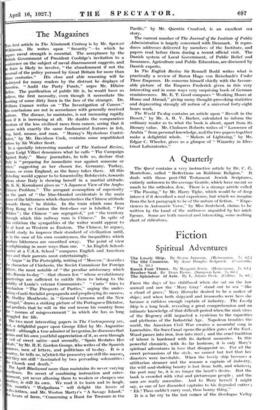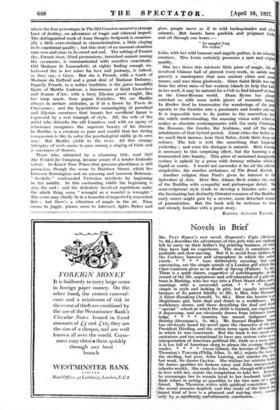Fiction
Spiritual Adventures
Knock Four Times. By Margaret Irwin. (Heinemann. 7s. &I.) Brother Saul. By Donn Byrne. (Sampson Low. 7s. (kl.) The Splendour of Asia. By L. Adams Bock. (Collins. 7s. W.: FROM the days of her childhood when she sat on the low seawall and saw the Mary Gray' stand out to sea " like a cloud of grace," Mary Hansyke desired to be a maker of ships; and when both shipyard and ironworks were hers she became a ruthless enough captain of industry. The Lovely Ship is a long book, revealing a great comprehension and an intimate knowledge of that diflicult period when the rank vices of the Regency still imparted a cynicism to the rapacities and plethoras of the Industrial Age. Napoleon troubles the world, the American Civil War creates a mournful song in Lancashire, the Suez Canal opens the golden gates of the East. Wood passes into iron, iron into steel ; and the cruel tradition of labour is burdened with its darkest memories. In this powerful chronicle, with its far horizons, it is only Mary's
spiritual adventures in love that disappoint us. For all the sweet persuasions of the style, we cannot but feel that her disasters were inevitable. When the lovely ship becomes a utilitarian steamer and the woman a captain of industry,
the wild soul-shaking beauty is lost from both, and whatever the port may be, it is no longer the heart's desire. But the book is crowded with vital and picturesque people ; and the men arc really masculine. And to Mary herself I might say, as one of her discarded captains to his degraded cutter " Eh ! Thoo suddn't carry coal, thoo bonny thing." It is a far cry to the lost corner of the Dordogne Valley where the four personages in The Old Countess unravel a strange knot of destiny, an adventure of tragic and ethereal import. The distinguished work of Anne Douglas Sedgwick is occasion- ally a little over-civilized in characterization, a little cloying in its emotional quality ; but this story of an unusual situation runs rare and clear to its sweet sad end. The setting of French sky, French river; lifted promontory, tarnished manoir among the syCarnores, is communicated with sensitive exactitude. Old Madame' de Lamouderie, at eighty finding enough un- hallowed fire in her ashes for love and jealousy, is indeed, as they say, a Goya. But she is French, with a touch of Madame du Deffand and a great deal Of Maclaine Dubarry. Equally French, in a nobler traditi6n, is the grave beautiful 'figure of Marthe Luderac, a kinswoman of Saint Genevieye and Jeanne d'Arc, with a faery Elysian gra& caught, like her harp music, from pagan Eurydice. We _see Marthe always 'in archaic attitudeS, as- if in a fresoo by Puvis de Chavannes ; and the hyaciathirie .commingling of paradiSal and Elysian sweetness that haunts her sacrificial figure "is expressed by a real triumph of style. Jill, the wife of the artist who disturbs the old Countess; and with an agony of -eltietance recognizes the supreme beauty of his dreams in Marthe, is a creature so pure and candid that her daring Compassion is like to solve the psychological riddle ip its own way. But Marthe yields to the river. All this strange interplay of souls seems to pass among a singing of birds and a sweetness of flowers. - Those who, attracted by a charming title, read Still She Wished for Company, became aware of a tender fantastic talent. In Knock Four Times that gracidus ghostliness is still pervasive, though the scene be Rainbow Street, which lies Between Kensington and an amusing and innocent Bohemia. " Sordello " confounded Victorian intellects by beginning in the middle. In this enchanting riddle the beginning is also the end ; and the delicately involved repetitions make the whole thing seem " wrought as a roundel is wrought:' 'lie scene may chiefly lie in a houseful of imperfectly Converted flats but there's a vibration of magic in the air. Time seems to juggle, planes seem to intersect, lights flicker and glow, people move as if in wild harlequinades and silve, minuets„..But. hearts have (puckish and poignant tri* and all through one hears :— " Le sanglot long Du violon."
Celia, with her wild humour and angeliepathos, is an adorable creature. Miss Irwin certainly possesses a rare_ and origia quality. .
One lays down this intricate little piece of magic, like al involved Chinese ball of pierced ivory-work, to salute gravely a masterpiece that uses ancient cities and saeroi names, and uses them gloriously: -Since Saint-Bride was ra from the silver rains' of her western islands to. help Our Lad in her need, it may be natural for a Celt to find himself at home in the Greco-Roman world. Donn Byrne has already enriched us with some noble pieces of romantic beauty, in Brother Said he transmutes the wanderings of the apostle to the Gentiles into a passionate and tender odyssey, It is impossible here to do justice to the marvellous tad, the subtle understanding, the amazing vision with. which makes us absolute contemporaries ..with the early Christ' the Romans, the Greeks, the Arabians, -and all the of inhabitants of that hybrid period, Great cities rise before us we smell their incense, bear their flutes, drink their deep colours. The tale is told like something that happe yesterday ; and even the dialogue is natural. Rich learning is necessary to this surprising effect, but the learning is transmuted into beauty. This piece of sustained imaginatir ecstasy is upheld by a prose with dreamy refrains which.' liquid as music. I would not surrender it for all the affee Simplicities, the wooden archaisms, of The Brook Kerioth.
Another religion than Paul's gives its interest to I' Splendour of Asia. Here Mrs. Adams Beck relates the st of the Buddha with sympathy and picturesque detail. semi-scriptural style tends to develop a falsetto note ; a the fascinating but distinctly Oriental romance of the Buddha Carly career might gain by a severer, more _detached mane of presentation. But the book will be welcome to th not already familiar with a great story.
RACHEL ANNAND TAYLOR.



































 Previous page
Previous page